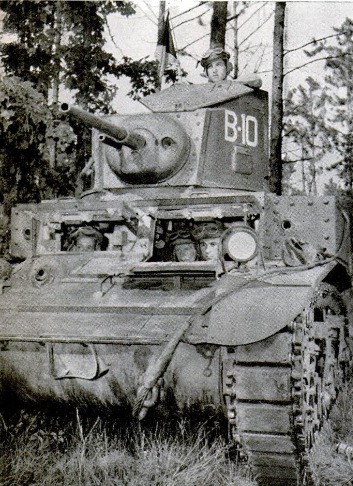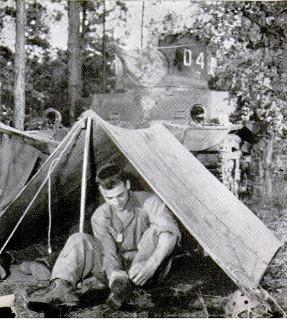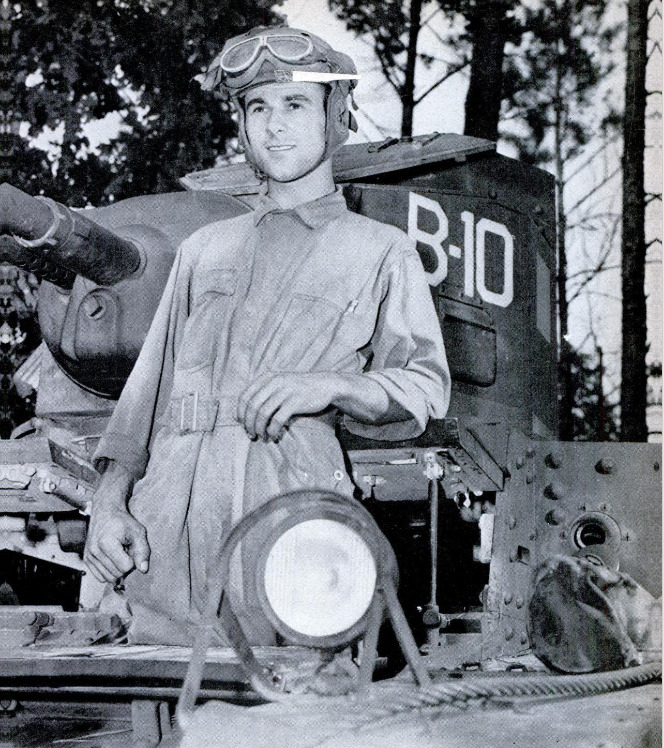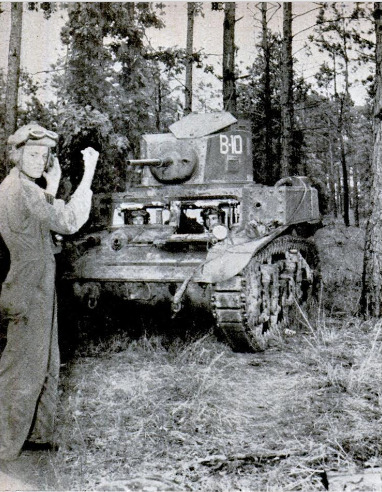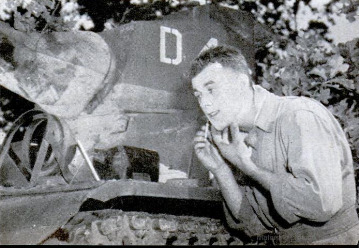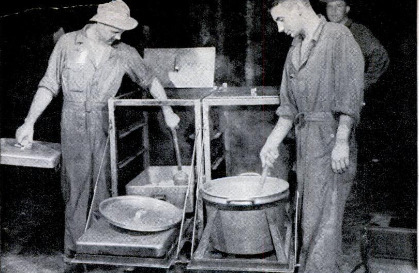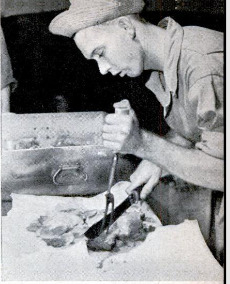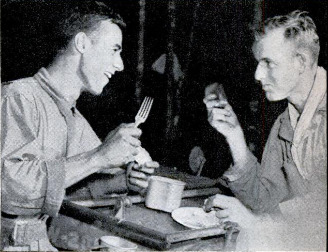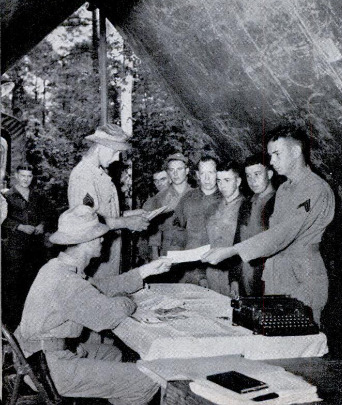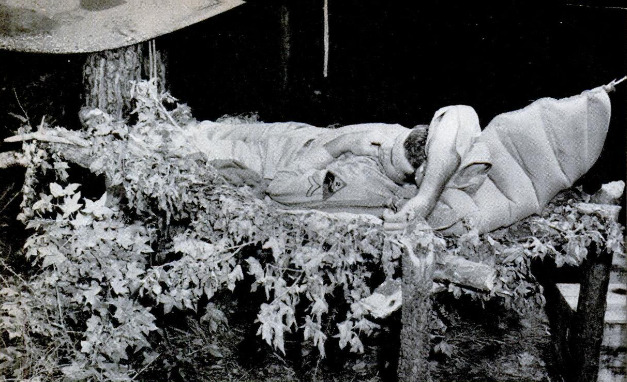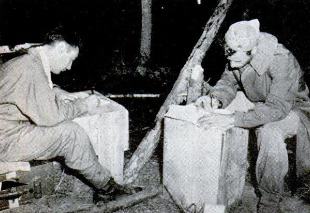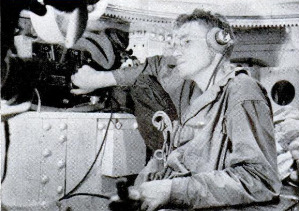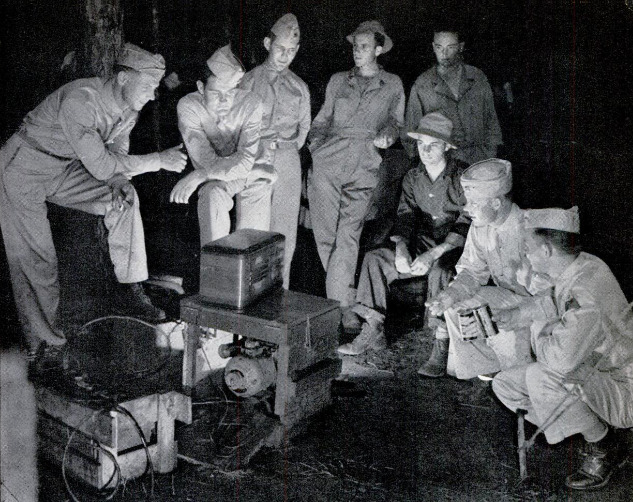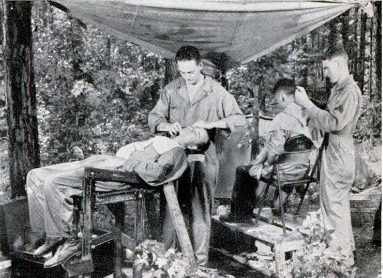-
Title (Dublin Core)
-
Americans take to tanks...
like ducks to water
-
Article Title and/or Image Caption (Dublin Core)
-
Title: Americans take to tanks...
like ducks to water
THOSE folks who have been squawking about
bad morale in the Army would do well to visit
some outfit of the 2nd Armored Division. It would
reassure them, for instance, to come up with the
2nd Battalion, 66th Armored Regiment, bivouack-
ing in the piney woods down south. Certainly it
would do their spirits good to meet Private
(Specialist 3rd Class) Jaillet.
Blackie Jaillet had been in the Army eight
months. His pay had been raised three times and
was in immediate prospect of going up another
ten bucks. He had gone through
three months of intensive schooling
with gas engines. Then, just before
his twenty-second birthday, he had
been made commander-driver of a
light tank. Blackie wasn't bellyach-
ing at all.
It was raining the day we met him.
It had been raining for several days,
and the Louisiana forest was like a
steam bath. The primitive back
roads, through which the column had
moved in yesterday, had been
whipped by the trucks and tanks in-
to a mere succession of hog wal-
lows. Later, when Blackie drove us
through those roads in his tank——pitching,
tossing, spray flying, into the ditch and out
—it was just like riding the bow of a sea
skiff into a heavy swell. Coming in with a
civilian car it was tougher going, passing
the streaming trucks and half-tracks, but
there was always a jeep to push us out of
the grip of General Mud.
Except for the crowded roads, the woods
seemed almost unpopulated. The 66th was
hidden back in the brush, tanks snuggled
under the shrubbery, tents in the thick trees. |
‘Water was dripping from the clothes hang-
ing by the Lieutenant Colonel's pup tent. |
Everybody was damp. Everybody was itch- |
ing with chigger bites. Everybody was hav- |
ing a wonderful time. |
It was just luck that we got to talking
with Blackie Jaillet instead of somebody
else. We wanted somebody who was new in
the outfit to tell us how he learned to drive
a tank. You could tell he was a selectee be-
cause he talked in the quick, nervous ac-
cents of the eastern industrial worker. Prac-
tically all the Regular Army men in the
outfit talk with southeastern drawls that you
could spread with a butter knife. The divi-
sion comes from Fort Benning,
Ga., and naturally got filled up
with local boys. Then, when
cadres were split off to form new
armored divisions, the ranks were
filled in with drafted men from
the north.
According to Blackie, it makes
a good combination. Practically
any buck private in the 2nd Arm-
ored Division will tell you he is
mighty glad he got assigned to
his company, because that is the
wildest, most reckless bunch of
tank riders in the whole lot. In
this Blackie Jaillet is no excep-
tion. He figures his outfit is
good for just about anything.
There is really nothing excep-
tional about Blackie, unless it is
his luck in getting a tank to
drive and the speed with which
things have happened to him.
He is just one of the mechanical
fingered American boys who,
during the past year, have been
tossed into the Army and told to
become tank soldiers. It seems
to have worked very much like
throwing a hatch of ducklings
into a puddle.
Leandre Joseph Jaillet, as the
baptismal records call him, is a
little fellow with dark eyes and
a quick, lopsided smile. That is,
he looks small because his mates
are so big, and the compact
build inside his coveralls doesn’t
show his 159 pounds. He came
from New Bedford, Mass., where
his father had been a deep-sea
diver. He went to high school
there three years, played foot-
ball. But last year he was work-
ing a lathe in a machine shop at
Gardner, Mass.
Blackie was 21 just in time to
be caught by the draft, and his
number came up early last Jan-
uary. Defense contracts were coming into
the shop, and he probably could have made
a good plea for deferment. But he decided
to take things as they came.
“How'd you like to go down to Benning
with the Armored Force?” the Army people
asked him when he told them he was a
mechanic.
“0. K.,” said Blackie. “I gotta spend a
year anyway.” He was philosophic about it.
So he went to Georgia and first put in six
weeks at basic training. Practiced close-
order drill, how to use a rifle, machine gun,
pistol. Though he’s been wearing coveralls
ever since, he learned how to wrap his leg-
gings. He practiced driving a truck.
Assigned to his outfit, he spent his first
day cleaning up a tank which had been
working in the mud. That taught him
plenty about the tank, all its cracks,
crannies, and crevices.
They took him for a ride and that
got him all excited, for he rode stand-
ing in the turret, hanging on and
bumping his ribs while the tank
twisted and turned, jumped and ca-
reened, clattering and banging with a _
terrific uproar. The old-timers were
giving the kids a workout, drilling in
their unofficial motto—reckless driv-
ing preferred. That is, it must seem
like reckless driving, but a man must
know what he is doing. No yellow
drivers wanted, said the sergeant. If
you were going to jump off a bank,
you had to pancake, land bellywhop-
per, and to do that you had to be going
anyway 35 miles an hour.
Blackie was to learn that on his first
maneuver problem. The corporal driving
took the tank off a seven-foot precipice and
did it too slow. The tank nosed straight
down, and the kid in the turret was pitched
out, into the hospital for a long time. They
weren't going fast enough, says Blackie,
though he never quite figured out what
would have happened if they'd tried to pan-
cake off a bank that high. He hasn't been
back to try it.
The second day Blackie started driving.
An instructor showed him the controls, then
took him to a place where a two-acre area
had been marked off.
“This place is all yours,” he said. “Take
it away.”
So Blackie drove to his heart's content,
learned how the thing handled, practically
by himself. Steering was easy, he found out
quickly. You have a lever in each hand.
Pull back on one, and it stops the track on
that side, speeds up the other track. Work-
ing them back and forth, right and left, you
can twist and turn like a snake. :
But that wasn’t the half of it. The real
art of driving a tank is in shifting the gears.
‘To slow down or stop, you don’t step on the
brakes; you shift into a lower gear. You
have five forward speeds, and you use them
all continually. To keep from grinding the
gears, the driver must be an expert at
double-clutching—going into neutral, engag-
ing the clutch, bringing the engine speed
into time with the lower gear, then complet-
ing the shift. He's got to do it just as nat-
urally as you'd slip your car from second
into high, if he wants to do a smooth job.
Blackie got the hang of it quick-
ly. These light tanks are powered
with an airplane-type radial Diesel
engine, a nine-cylinder Guiberson,
and it is important to keep the
r.p.m. within a certain range—
1,400 to 2,200 is about the maxi-
mum spread, and 1,800 about right.
You have a gauge to tell you the
revs, but Blackie soon learned to
tell them by listening. He learned
never to let his engine labor, al-
ways to go into a gear at which she can
easily handle her 13 1/2-ton load. i
This was a lot different from car driving.
You couldn't casually step on the gas or the
brake. You couldn't lean back and let the
tank drive itself. A tank is never under
control, and you must keep driving it every
minute. Blackie learned to go into a lower
gear before he came to a ditch or a curve,
s0 that in any maneuver he could keep the |
engine and tracks pulling. Against all his |
instincts he learned that he must give her |
the gun on a curve, so as not to slacken off
on track tension and throw a track.
About this time Blackie had been in the
Army two months. His base pay continued
at $21, for four months, before it went to
$30. And now he got a rating as a mechanic,
5th class, which meant $6 extra,
Sergeant Curtis Mitchell, from Eupora,
Miss., who rides a tank like a broncho, was
putting Blackie through the jumps. Blackie
needed his big helmet, like oversized foot-
ball headgear, as the iron horse bucked and
careened,
“Monkey see, monkey do,” said the ser- |
geant. “Drive her this way. That's the way
to learn.”
You can't relax when you're driving a
tank, and there's no taking it easy in the
training for it, either.
Within a week Blackie was driving in a
convoy, straining every nerve to keep at the
proper 50 yards distance from the tank in
front of him. The sergeant taught him to |
watch for a burst of exhaust smoke from
the tank ahead. That meant the driver was
speeding up his engine in order to shift gears
and slow down. So Blackie had to shift
quick too. |
Blackie learned to drive by nose and by
ear. Moving in convoy by night, blacked
out, your little blue lights show you only
about ten feet of the road ahead. But you've
got to keep that 50-yard space, for safety
from bombing. Blackie learned quickly to
slow down when he smelled a fresh blast of
exhaust smoke from his leading tank. But
the ear business was harder. Amid all the
clatter and banging of the tank, like a mov-
ing boiler factory, he gradually learned to
pick out the humming sound of the muffler
ahead. When that humming increased it
meant to speed up, the tank ahead was go-
ing faster.
A tank outfit is no place for a tree lover.
Blackie learned to drive in the woods, mow-
ing down the pines like weeds, apparently
with reckless abandon, actually with tense
care—twisting and dodging among the trees
where feasible, or banging square into them
and pushing them over. You mustn't bang
your tracks into a tree, but pick your tree
and take it full between the tracks. A light
tank pushes over an eight-inch pine tree
easily, but a smaller oak or hickory will
give it a jot.
Blackie learned to duck around a tree
that was leaning toward him. It might fall
toward the tank, instead of away, and kill
the man in the turret. He learned to be
careful about back-tracking—that is, driv-
ing back in the opposite direction over a
woods route where tanks have come. First,
the ground may be all mushed up and bog
you down. Second, there will be a sapling
‘pushed over, which has sprung back up just
enough to crash in through the openings of
the tank like a shattering spear. Back-
tracking through the woods you always
have to button up—close up your armor
plate and drive blind.
Driving in a blackout is like blindman’s
buff, but driving buttoned up is worse. There
is only a tiny slit to see through, and the
driver can only give perfect obedience to the
man standing in the turret. Foot on the
right shoulder, turn right; foot on the left
shoulder, turn left; kicks in the back for
other things. Teamwork and implicit trust
is what this takes.
Blackie was just getting good when they
raised his pay again—to 4th Class Specialist,
$45 a month—and sent him to Fort Knox
for three months. There he studied gas en-
gines intensively, not just tank engines, but
truck and car engines—stuff that will be
useful all his life.
He got back to his outfit in July, feeling
pretty cocky, and was put on K.P. duty for
a week. Everybody in the 66th does his
trick at K.P. And when Blackie got another
advancement, to 3rd Class Specialist, $50 a
month, he didn't feel at all bad about it.
Soon after this Blackie got his full permit
as a tank driver. (Army drivers have per-
‘mits, like civilian licenses, qualifying them
for driving different kinds of vehicles.) And
incredibly soon thereafter, he found himself
put in complete charge of a tank. Ordinarily
a noncommissioned officer commands a tank,
but with so many being moved to other out-
fits, or going to school, nowadays frequently
a private gets the chance.
There was only one trouble. None of his
three-man crew was yet fully qualified to
drive in maneuvers, so Blackie had to do
the driving himself and put one of his men
in the turret. But that was only for a short
time. Blackie was monkey-see-monkey-do-
ing them at a great rate. Soon he would
ride in the turret of his own tank, just like
the general.
‘That's Blackie's story. Nothing especially
startling about it. But multiply it a few
thousand times, and then you have some-
thing. Blackie's glad he went in the Army.
He thinks it's treated him fine.
He's hoping he won't get that $10 raise
Congress has promised for the second year
in the service. He has a girl back home.
He calls her up every payday, but that is
not so good as being there. At the end of
his year he'd like to go home to his job.
But of course, if Uncle Sam really needs
him longer, that will be O. K. by Blackie.—
HICKMAN POWELL.
-
Language (Dublin Core)
-
Eng
-
Date Issued (Dublin Core)
-
1942-01
-
pages (Bibliographic Ontology)
-
114-120
-
Rights (Dublin Core)
-
Public domain
-
Archived by (Dublin Core)
-
Sami Akbiyik
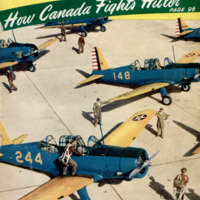 Popular Science Monthly, v. 140, n. 1, 1942
Popular Science Monthly, v. 140, n. 1, 1942

